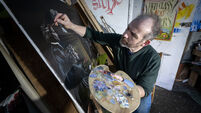The horse saved from slaughter and his 'Invincible' bloodline

Aisling Rice from Co Clare, with Coady. PIcture: Moya Nolan
A racehorse, which was saved from slaughter after an animal rescuer volunteered to rehome it, turned out to have been sired by 'racing royalty'.
Co Clare woman Aisling Rice, who runs a small rescue farm, says it is just another example of how animals in this country are discarded when they have outlived their usefulness.














